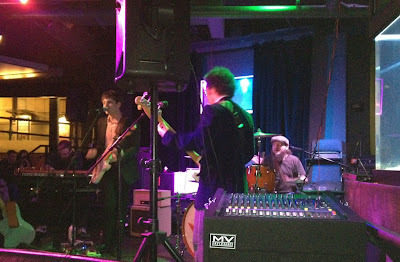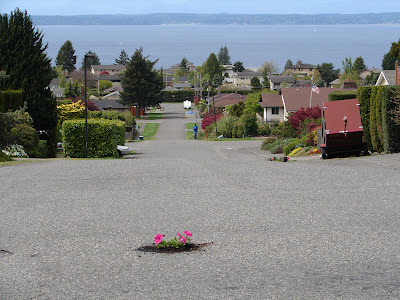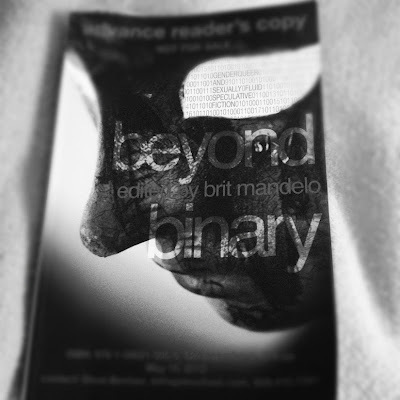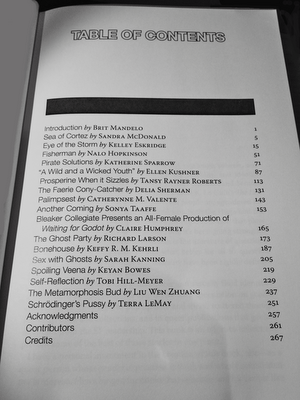Nicola Griffith's Blog, page 121
May 5, 2012
Slowly, and with no sudden moves
 Red Jacket Mine, MusicquariumI'm a little blurred and slow-moving today. Last night we attended a private non-profit event (for 826 Seattle--they do terrific work), with good food and Champagne provided by Wild Ginger--free food, free wine. I probably drank more than was strictly necessary. Then we made the fatal mistake of dropping by the bar (the "Musicquarium") on the way out. We stayed, drinking beer, listening to the band, and talking to a friend, until the wee small hours.
Red Jacket Mine, MusicquariumI'm a little blurred and slow-moving today. Last night we attended a private non-profit event (for 826 Seattle--they do terrific work), with good food and Champagne provided by Wild Ginger--free food, free wine. I probably drank more than was strictly necessary. Then we made the fatal mistake of dropping by the bar (the "Musicquarium") on the way out. We stayed, drinking beer, listening to the band, and talking to a friend, until the wee small hours.So, yeah, not the most alert I've ever been. If you want to get my attention, please talk slowly and without too many sudden movements or loud noises.
Published on May 05, 2012 11:50
May 4, 2012
Now on Goodreads
I now have an actual author page at Goodreads. The UI is a bit, hmmn, interesting in places, so be warned you might stumble over some weirdnesses created while I was bumbling about yesterday.
But ignore all the hapless mistakes and come say hello. It would be lovely to have some friends.
But ignore all the hapless mistakes and come say hello. It would be lovely to have some friends.
Published on May 04, 2012 07:04
May 3, 2012
Portable Legal Consent
While I wait for a couple of publishing-related things to happen, I've been catching up on my reading.
This week's Economist has an article, Consent 2.0, on Sage Bionetworks' Portable Legal Consent, which aims to make genomic data available to researchers in massive "de-indentified" chunks.
I'll look forward to seeing how this goes.
This week's Economist has an article, Consent 2.0, on Sage Bionetworks' Portable Legal Consent, which aims to make genomic data available to researchers in massive "de-indentified" chunks.
IN AN age where people promiscuously post personal data on the web and regularly click “I agree” to reams of legalese they have never read, news of yet another electronic consent form might seem like a big yawn. But for the future of genomics-related research the Portable Legal Consent, to be announced shortly by Sage Bionetworks, a non-profit research organisation based in Seattle, is anything but mundane. Indeed, by reversing the normal way consent to use personal data is acquired from patients in clinical trials, it could spell a new relationship between scientists and the human subjects of their research, with potential benefits that extend well beyond genomics.This is the first step in an open-data movement. In terms of genomics research, it could be compared to software's open-source movement. It will increase the long-term value of the data--making it useful in ways perhaps the original investigators hadn't imagined. Absolutely a Good Thing. I hope Sage Networks can figure out a way to extend this idea outside the US. Big data is useful data.
I'll look forward to seeing how this goes.
Published on May 03, 2012 11:30
May 2, 2012
Eeeevil
Published on May 02, 2012 07:31
May 1, 2012
Ukulele acquisition syndrome
Via a friend (thanks, Karina) this video of how to make one tiny ukulele sound like an entire studio-of-musicians playing "Billie Jean." At least if you're James Hill.
I'm beginning to see the attraction of ukuleles.

I'm beginning to see the attraction of ukuleles.
Published on May 01, 2012 09:46
April 30, 2012
Agile novel development
In the world of modern commerce, 'agile development' is one of the nifty catchphrases that entrepreneurs throw about airily. It means, basically, figure it out as you go along; fling something up there, take user feedback, and fix it. It's an iterative (another catchphrase) process.
If it doesn't work, pivot (yet another hip-happening-yeah-baby phrase) in a new direction.
I'm all in favour of this stance in terms of developing a browser, a cloud-backup app, or photo-editing tools. But fiction is different.
A reader comes to a story for the first time only once. A story is an experience. I want that first experience to be meaningful, to feel as though it's really happening.
This is why I don't send out a zillion copies of the first draft of my books. It's why I don't post the writing as I go. I want my fiction--a novel, a short story--to be as good as good as it can be before being released into the wild. I want you, dear reader, to be swept off your feet. Only a fully-realised work of art can do that.
You've been very patient in the matter of Hild . But she is on the way. Stay tuned.
If it doesn't work, pivot (yet another hip-happening-yeah-baby phrase) in a new direction.
I'm all in favour of this stance in terms of developing a browser, a cloud-backup app, or photo-editing tools. But fiction is different.
A reader comes to a story for the first time only once. A story is an experience. I want that first experience to be meaningful, to feel as though it's really happening.
This is why I don't send out a zillion copies of the first draft of my books. It's why I don't post the writing as I go. I want my fiction--a novel, a short story--to be as good as good as it can be before being released into the wild. I want you, dear reader, to be swept off your feet. Only a fully-realised work of art can do that.
You've been very patient in the matter of Hild . But she is on the way. Stay tuned.
Published on April 30, 2012 05:41
April 29, 2012
Prettying the potholes
It turns out that one of our neighbours has a puckish sense of humour and an activist streak. It's a pretty cool combination.
Every winter the endless rain opens up potholes on Seattle streets. It used to be that by spring the city had filled them all in. This year, budgets being what they are, not so much. Chiropractors are making a mint.
Our neighbour, after planting her spring garden, found she had a couple of geraniums* left over. She decided to use them to make a point while brightening up the day for us all:


She calls them "punk'd potholes". Drivers slow down, frown, then smile and drive on more slowly and with a greater appreciation for the day.
And I appreciate our neighbour.
* If you've read And We Are Going to Have a Party you know that geranium scent has certain, ah, associations for me. So I've been smiling a lot...
Every winter the endless rain opens up potholes on Seattle streets. It used to be that by spring the city had filled them all in. This year, budgets being what they are, not so much. Chiropractors are making a mint.
Our neighbour, after planting her spring garden, found she had a couple of geraniums* left over. She decided to use them to make a point while brightening up the day for us all:


She calls them "punk'd potholes". Drivers slow down, frown, then smile and drive on more slowly and with a greater appreciation for the day.
And I appreciate our neighbour.
* If you've read And We Are Going to Have a Party you know that geranium scent has certain, ah, associations for me. So I've been smiling a lot...
Published on April 29, 2012 07:52
April 28, 2012
#FeministSF twitter interview Sunday April 29 11 am/2 pm
Tomorrow at 2 pm EST/11 am PST I'll be doing a Twitter interview with @traciewelser using the hashtag #FeministSF. These things usually last for about an hour.
I hope some of you will join me and bring questions. (It'll be an interesting challenge answering them in 140 characters.) If you do, use an app like Tweetchat. It's free, it adds the hashtag for you automatically, and its response time is faster than most apps such as Hootsuite and Tweetdeck.
For those of you with a serious interest in my work and how it relates to the wider world of feminist SF, you might find it worthwhile to read some of the following.
First, archives of two online book discussion of Ammonite by the listserv fem-sf:
Fem-sf book discussion, 1998
Fem-sf book discussion, 2004
And then some essays and blog pieces I've written in the last few years with direct bearing on my science fiction:
Hard SF and Soft (or, Girls vs. Boys)
A short, rant-like blog post on the gendered nature of SF classification and marketing
Elves and Anglo-Saxons and Gender
Exactly what it sounds like: a post exploring the gender of elves through time
War Machine, Time Machine
Co-written with Kelley Eskridge (my partner, and author of New York Times Notable novel Solitaire), an essay about our lives as writers, with some words about essentialism and its silliness
Layered Cities
A relaxed consideration of Slow River and cities
But you don't need to have read any of this to come and play tomorrow. See you then.

I hope some of you will join me and bring questions. (It'll be an interesting challenge answering them in 140 characters.) If you do, use an app like Tweetchat. It's free, it adds the hashtag for you automatically, and its response time is faster than most apps such as Hootsuite and Tweetdeck.
For those of you with a serious interest in my work and how it relates to the wider world of feminist SF, you might find it worthwhile to read some of the following.
First, archives of two online book discussion of Ammonite by the listserv fem-sf:
Fem-sf book discussion, 1998
Fem-sf book discussion, 2004
And then some essays and blog pieces I've written in the last few years with direct bearing on my science fiction:
Hard SF and Soft (or, Girls vs. Boys)
A short, rant-like blog post on the gendered nature of SF classification and marketing
Elves and Anglo-Saxons and Gender
Exactly what it sounds like: a post exploring the gender of elves through time
War Machine, Time Machine
Co-written with Kelley Eskridge (my partner, and author of New York Times Notable novel Solitaire), an essay about our lives as writers, with some words about essentialism and its silliness
Layered Cities
A relaxed consideration of Slow River and cities
But you don't need to have read any of this to come and play tomorrow. See you then.
Published on April 28, 2012 09:57
April 27, 2012
Brit Mandelo interview, part 3 (of 3)

[This is Part 3 of my long, conversational interview with Brit Mandelo, editor of Beyond Binary: Genderqueer and sexually fluid speculative fiction (Lethe Press, April 2012). See earlier this week for Part 1 and Part 2.]
What do you think about reviews? If you could pick anyone, alive or dead, to review this book, who would it be? Why?
As a critic and reviewer, I'm obviously biased, but I love reviews. I think they fill a really integral niche in the discourse about stories, and when done well—not a book report, but a true investment of thought, a sort of dialogue between the critic and the text—they're also an art in and of themselves. I buy a lot of books based on reviews—sometimes because what the reviewer hates about the book, I know I would love, and sometimes the opposite. As for reviews of my own work, I'm always intrigued by seeing what other people read in the text I made; there's always a gap between intention and reception, and seeing how the books or stories are read is interesting for me on a critical level. For anyone who's skeptical about book reviews, go and read the collected reviews of Joanna Russ in The Country You Have Never Seen. That's what good criticism can do.
And on that note, is it sort of obvious that I would answer, Joanna Russ? Because yes, if I could choose anyone, I would choose Russ.
She might have thought Beyond Binary was an abysmal failure, but she would have said why in a cogent, incisive, powerful way. That sort of criticism matters. It's part of the fail, fail better ethos, I think. Or, if she enjoyed it, the review would still, I'm certain, be cogent, incisive, and powerful—but it would be saying different things, equally useful and important things. And, really, I just would like to know what she thought of this effort, as she wrote so many grand stories herself that dealt with these issues of gender and sexuality.
Yeah, I would have picked Russ, too. Let's talk about community now. I've seen a lot of public support for this project on the Outer Alliance list (and reviews on Autostraddle and io9). How helpful has what community been in the creation, and sale, and now marketing, of this book?
The speculative, queer, and queer/speculative communities have been immensely, ridiculously, wonderfully helpful throughout the whole process. The outpouring of support, advice, and interest was stunning, from the moment I announced the call for submissions onward—and, in the story-solicitation process, folks were for the most part enthusiastic about the project and wanted to be part of it.
People gave me books, sent me story suggestions, and offered literally hundreds of ideas about potentially useful avenues of research via email, my blog, and Twitter. When I opened the call for submissions, I had a huge influx of stories—and, what was really fascinating: many of the people who were submitting also made suggestions for other stories in their cover letters. So, they would be sending their own work in hopes of making it into the book, but also telling me: "hey, here's another story I loved, too." That was kind of beautiful, and showed, I thought, how much support the community was offering the book. People saw the call for submissions all over, too—some from Lambda Literary, some from speculative communities, etc.
And, as I said before, the sale of the book was really a matter of community also—Steve at Lethe knowing I wanted to embark on this project, and taking a risk on giving me the opportunity to do so, though I had no prior experience.
The marketing has been hugely community-driven, too, in a way that I think every writer/editor hopes for. The authors in the book have been great about spreading the word, publications from both communities have given it a lot of attention, and I know there are some great reviews and other things forthcoming about it from sources I never would have expected. Hell, my university department decided to fund, host, and advertise a release party—and that's the academic community.
I wanted to do Beyond Binary because I thought we needed a book like it—and I'm indescribably moved by the fact that the community at large has been so clearly, publically, awesomely excited about it, too. It's really all I could have hoped for. I mean, look at this artifact right here—this interview. Support in action!
Whose experience and advice did you seek before/during/after bringing the book into being? What would you do differently?
I asked for a lot of advice over the course of creating the anthology. For one thing, I asked the internet at large, all the communities of which I was a part, for help finding stories. I knew that there was no way I had read everything, or could find it all on my own. That was sort of the impetus of Beyond Binary, anyway—that these stories were out there, but dispersed and hard to find. I'm not magic; I knew I needed help to find things. I'm sure I still missed a lot, even with the help and advice I received. On a smaller scale, I sought advice on things like how to ask for blurbs, and what a story solicitation letter should look like, and whether I should send them to the authors or their agents—all of that important technical stuff. After the book was put together, when it came to marketing and party planning and all of those complicated things, the seasoned pros that I know, and who are in the book, have been indispensable. Ellen Kushner and Delia Sherman have been a great help through the process—advice, guidance, and experience were all on offer. Without them, we probably wouldn't be having a book release party at WisCon!
You don't realize exactly how much you don't know, until you run smack into it. There were a lot of moments like that, and I keep having them even now that the book is in distribution. In fact, I solicited some panicked advice about what to do at a release party where I'm supposed to entertain a crowd for an hour, last night, from the person who's running the event and does these kinds of things often. And then I asked some other writer-friends, too, for good measure.
But, looking back, I think I would have liked to have spoken to a few more experienced editors about things like how to organize the table of contents, what their guiding philosophies were, and how they handled author correspondence—those sound like almost very business-y sorts of things, but they were where I felt my lack of experience the most. I was under the wire by the end of the process, though, and didn't feel like I could impinge on folks' time to ask for some advice.
Maybe if there had been a convention around that point I would have done so, hah. I've had opportunities to ask for advice since then from great sources like Ellen Datlow, in the context of my new job at Strange Horizons, and some of the things that I've been told by more experienced people since putting together Beyond Binarywould have been helpful at the time. Simple stuff, like I mentioned above, that I was just fumbling my way through.
I'd ask you what your secret goals were for this book--but then they wouldn't be secret anymore. So tell me some of the pitfalls you think you've avoided (or not) in the process.
I hope that I've included a diverse set of voices in the book, and an even more diverse set of stories. This is at once a pitfall I've avoided and tripped into, though—as I said before, I know that the book isn't a complete picture, and that I'm lacking in several sorts of stories. Yet, I feel like in what is there, there is diversity across and off the spectrums of gender, sexuality, age, race, and culture—from a teen girl living in poverty who is exploring her attraction to both men and women, to stories like those we talked about above, that are dealing with complex nontraditional relationships in secondary worlds, and fluid or alternative gender identities in a contemporary setting with elderly protagonists. I hope that I've avoided the pitfall of a single story, a single narrative about what "genderqueer and sexually fluid" means, or can mean.
What is the greatest joy or satisfaction you gained from the experience?
Seeing people's responses to the text has, by far, been the greatest joy in a series of joys. I thought at first that it would just be the chance to read so much great genderqueer and sexually fluid fiction. I loved that, certainly! So much good reading. There was also the satisfaction of contributing this book to the greater conversation, foregrounding these stories and voices where they're so frequently invisible, absent, or ignored. But, in the end, it's the reader response and the fact that this book seems to be doing what I so wanted it to do: offering people a vital chance to see their own stories spoken, and stories about people like themselves. And people are saying that yes, they are happy to see this book on shelves, to have these voices emphasized—that it means something to them. There's nothing more powerful than that, for me.
What's next?
I have a couple of short stories forthcoming, in Apex Magazine and Tor.com, and I'm currently working on several other short pieces, plus doing research for a potential novel project. Also, editorial work at Strange Horizons, which continues to be great and really absorbing. Balancing writing, editing, criticism, and everything else is a little crazy at the moment.
As for Beyond Binary, there will be a book-party with several contributors reading from their stories, plus tea and cookies, at WisCon 36 in Madison WI, May 25-28th!
That sounds like a party I'd enjoy. I'm just sorry I can't be there. Have a blast! Sell many copies of Beyond Binary!
Published on April 27, 2012 06:33
April 26, 2012
Brit Mandelo interview, part 2 (of 3)

[This is Part 2 of my long, conversational interview with Brit Mandelo, editor of Beyond Binary: Genderqueer and sexually fluid speculative fiction (Lethe Press, April 2012). See yesterday's post for Part 1 and the next for Part 3.]
In your introduction you say that you know we've got a way to go, that you feel "the lack of alternative pronouns and the lack of intersex folks as tellers and protagonists of their own stories." How should we encourage writers to fill this gap?
Having more venues that are willing to publish these kinds of stories, or are not only willing to publish them but actively seeking them out, would go a long way, I think. That would be one definite positive behind doing another book like Beyond Binary, but with original stories—the opportunity to seek out the kinds of stories that are missing, and the voices that don't get enough recognition. It is very difficult to speak if no one is listening; it is also difficult to speak in a cultural context that is constantly trying to erase you from existence, as language structured around a gender-binary can do.
There are magazines doing this kind of work—Strange Horizons, for one, and also Expanded Horizons and poetry publications like Stone Telling. But, I think we need more, and we need more vocal, public encouragement for writers from these subject positions to feel as if they are welcome and that their stories are valued.
I also think that a more easily traversable connection between the queer and speculative publishing communities would help—many queer writers who are dealing with these issues don't publish in the speculative field because they haven't felt welcome; many speculative writers don't read or publish in specifically queer venues. Reading for Beyond Binary sort of put a point on this division, seeing what names only appeared on what side of the proverbial fence, and noticing the few that came up on both. I think a greater dialogue between writers and publications across both fields would help encourage greater diversity in material and open up a more fluid space for storytelling.
Really, I suppose it boils down to: be welcoming. Be open. Say "we want to hear what you have to tell us," and listen to the stories. And for writers who want to deal with these topics but are not themselves genderqueer or intersex, research—tons upon tons of sensitive research—is the key, along with an understanding that these topics are fraught, real-life things for plenty of people, not exotic story-fodder. Exoticism is worse than nothing at all, in many ways. (I'd refer readers to the excellent TED talk by Chimamanda Adichie, "The Danger of a Single Story," as to why I think that nuanced stories and stories told from subject positions that are normally effaced from the cultural dialogue are important. Writing the Other , by Nisi Shawl and Cynthia Ward, has a lot to say on these topics, too.)
I know an editor can't admit to favourites. But I'm not bound by such constraints so I'd like to talk about the two pieces in the book I think really fulfill the promise of the title.
First, "The Metamorphosis Bud," by Liu Wen Zhuang (pen name of Cynthia Liu). It's wonderful; it captures the pure curiosity evident in so many people who live a long life and find themselves essentially happy (it reminds me a little of some of Le Guin's short work). It's an outrageous premise made utterly believable by the simplicity of its language.
Second, "Eye of the Storm," by Kelley Eskridge. Obviously I'm biased (Kelley is my partner) but it's beautifully written, hard and clear as a bone. And it hits many of the notes you call out in your introduction:
The people in these stories do not accept the prescribed gendering of their bodies... They refuse to choose "one or the other" in their gender, sexuality or relationships. They redefine what the term "man" and "woman" can mean, how "he" and "she" may be used. And--most importantly--they embrace their own selves, their own definitions, and their own needs, physical and emotional... To that end, there are stories in which the protagonist is never once gendered by other characters oro the author...and stories in which sex is defined and enjoyed a little differently than mainstream expectations. There are a variety of relationship-structures, too; no limiting things to couples, here.
And it does so with subtlety and grace--so much, in fact, that most readers don't even notice that Mars has no assigned gender, and doesn't claim one, either, without it being an issue for anyone.
Where and when did you encounter each, and why did you think it would work for Beyond Binary?
I'm glad you liked them!
These were both stories that I first encountered during my serious reading period for the anthology, when I was sifting through folks' story suggestions, stacks of older collections, back issues of magazines, et cetera.
I read "The Metamorphosis Bud" in Cecelia Tan's mid-nineties anthology Genderflex, published by Circlet Press. I had sought out as many gender-related anthologies as I could find to look for potential stories, and Tan's book had this gem in it. I also have her to thank for putting me in contact with the author, Liu Wen Zhuang (Cynthia Liu), to solicit the story. The thing that struck me most about this piece was its mix of whimsy and realism; the protagonist is so very matter-of-fact about her new body part, how it does and doesn't affect her identity. In that way, this story also touches on issues of body identification and intersex identities, though implicitly. The sense of community in the story between the elderly protagonist and her young, queer friends is great, too. Overall, it was a very positive, pleasant story that dealt in a down to earth way with the gendering of body parts and the fluidity of gender identities. Had to have it!
"Eye of the Storm" (originally published in Ellen Datlow's Sirens and Other Daemon Lovers) was suggested by Sonya Taaffe, another contributor to the book, in a comment on my call for submissions—and as soon as I read it, I knew it was absolutely perfect for Beyond Binary, for all of the reasons you've just discussed. It took me until about the third page of the story before I realized with shock and delight that there were no pronouns given or used for Mars; from there, I only loved it more for the awesome nontraditional relationship of the quartet, the different sorts of sexuality involved, and the rich, evocative prose that tied it all together. The coming-of-age adventure elements were spot-on engaging reading, too.
Did you agonise over the order of the stories? Did you consider writing introductions?
Putting the stories in order kept me up nights! I felt like I was putting together an impossible jigsaw puzzle where I could never quite find the right edge pieces or how to line up the middle. I was especially sensitive about the story order because that's one of the things that, in my role as a critic and reviewer, I'm constantly nattering on about—how an anthology flows from one piece to the next, the effects the juxtapositions create, all of that stuff. Turns out it's extremely difficult, hah. For the most part I was trying to create interesting juxtapositions, with stories that were similar in some tangential way—theme, setting, tone—leading one into another. Obviously, this didn't always work perfectly, but it seemed better than simply lining them up in alphabetical order, or something like that.
I did think about writing introductions, but in the end decided against it. Many of these stories are doing several things with their themes and commentary; if I were to write introductions on how I felt about each, I was afraid that would privilege or foreground my interpretation too much. Instead, I wrote a larger introduction to the book itself, and let things stand there.
Let's move on to publishing and marketing. Why did you choose Lethe Press and how has that experience been?
Lethe Press publishes quite a lot of quality queer speculative fiction, and they're one of the few presses that's actively bridging that aforementioned divide between queer and speculative publishing. I consistently look forward to their books. And, to be truthful, it was more that Steve Berman of Lethe sought me out—I had been making comments about genderqueer stories and sexually fluid stories in my Tor.com columns for a long while, and regularly wishing that there were books like Beyond Binary. When I was laid off from my job managing a bookshop (oh, Borders, how I miss thee), Steve asked me why I didn't just edit the book that I wanted to exist so badly, and offered me a contract for it. It hadn't occurred to me that I had the skill set to bring this project to fruition, but Steve thought I did, and I'm glad he took that chance.
The experience has been good; because they're a small press, they offer a lot of one-to-one, hands-on support and advice—and because they've had a strong publishing record, they also have good relationships with indie stores, distributors, and the major review publications. So, best of both worlds! Plus, on a less frank-business-model level, Steve's enthusiasm for the project was indispensable, and Lethe's designer, Alex Jeffers, did a great job with the book—far and above the call of duty. I loved his idea to embed the page numbers in a string of binary code, for example. They're also supportive in marketing: great about sending books out for review, for contests, and the larger scale stuff. But, as with any small press, the majority of the grass-roots marketing is my responsibility—seeking out blurbs, interviews, contacting indie bookstores about ordering, organizing a book release party, all of those kinds of things. I've learned a lot about publishing and marketing in the process.
How did you decide who to solicit for blurbs? What kind of response did you get? How would you do it differently next time?
It was not what you would call a scientific or well-planned approach. I sat down in front of my bookshelves and made a list of folks who had written, edited, or curated stories at all like those in Beyond Binary. The way that I think about blurbs is that they're a sort of "word of mouth" that gets printed in the text; so, to narrow that list, I thought of who I would want to recommend me a QUILTBAG book of stories, and then asked those folks if they'd like to read the book.
I did get positive responses about the book across the board, but not all of the people in question could make the rather short deadline we had between printing/mailing ARCs and the date we would need the blurbs by. That narrowed the field quite a bit. Writers and editors are busy people, and I know I would have trouble cramming a whole new book to read into my reviews-and-other-reading schedule on short notice, so it didn't surprise me that other folks couldn't, either. So, next time, I think what I would like to do is have ARCs much further in advance and give potential blurb-ers more time to read and respond.
I put a lot of thought into the blurb I wrote for the book. I wanted to do everything in power to help this book reach its audience. But I'm not terribly convinced that blurbs make much difference--and they cost a lot, sometimes, in terms of owing favours. What do you think?
Thank you for that wonderful blurb, by the way – it meant a lot to me!
To be honest, I'm pretty ambivalent about blurbs. While I do think of them as a form of word-of-mouth recommendation, which is pretty damn great, I often suspect that only people working in publishing care about them, based on years of working as a bookseller. Rarely, if ever, did I overhear a customer saying, "hey, so and so blurbed this, I should get it!" Rather, it was "I read a review about this in x," or "my friend says I would love this," or in the case of anthologies, seeing a familiar author's name on the table of contents. But on the third hand, I have bought a book based on seeing a favorite author's recommendation printed on the cover—however, I'd also usually already seen them mentioning it on a more personal level, on Twitter, their blog, etc. So, was it the actual blurb I was responding to, or the element of word-of-mouth it represented? Complicated. At the very least, they can't hurt.
I did find the process of asking weird and uncomfortable, though. There's something a bit squidgy about approaching friends and colleagues to ask them to read your book and then say something concise and interesting about it. A definite presumption on their time, for one thing. I did it, and I would do it again—your blurb was great, and Charlie Jane Anders at io9 ended up writing a whole review, which was also totally amazing—but there's certainly an ambivalence in me regarding the whole thing.----[More tomorrow...]
Published on April 26, 2012 05:39




